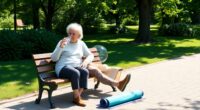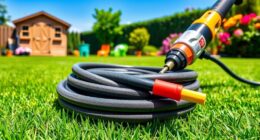You won't believe how easy it is to boost your health as you age! Embrace regular physical activity and discover low-impact exercises tailored for you. Prioritize fall prevention techniques to stay safe at home. Engaging in lifelong learning sharpens your mind. Don't forget to nurture social connections; friends make everything better! Utilizing technology can keep you connected. Finally, practicing mindfulness and exploring music therapy can elevate your well-being. Stick around to uncover even more wellness hacks!
Key Takeaways
- Regular low-impact exercises like yoga and tai chi enhance strength, flexibility, and mental health while reducing fall risks.
- Engage in lifelong learning through workshops to stimulate brain activity and improve cognitive function.
- Utilize technology for video calls to maintain social connections, reducing feelings of isolation and enhancing well-being.
- Incorporate mindfulness practices such as meditation and deep breathing to alleviate stress and anxiety, promoting emotional stability.
- Participate in music therapy sessions to enhance emotional well-being and stimulate cognitive functions through engaging activities.
Embrace Regular Physical Activity
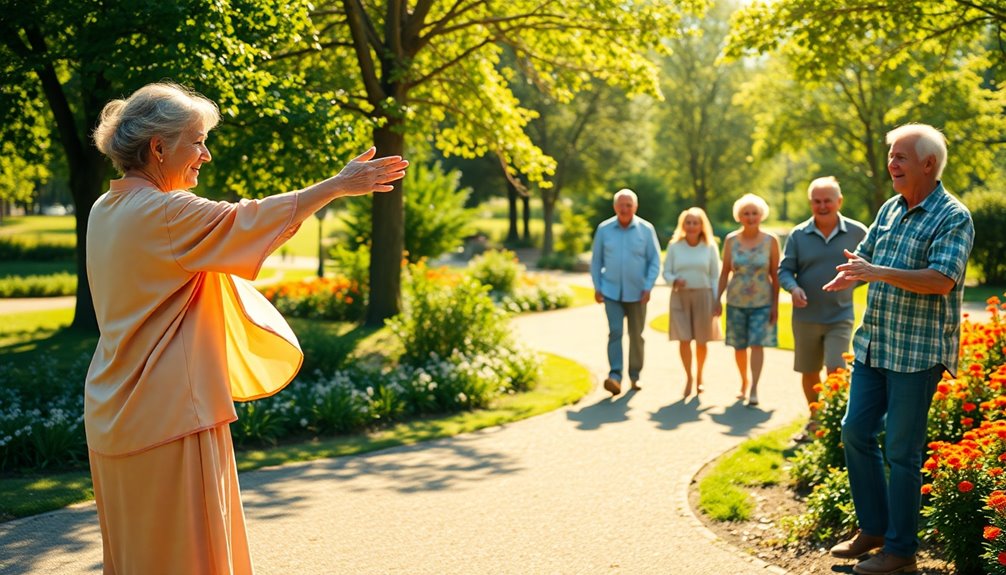
Embrace Regular Physical Activity
When you embrace regular physical activity, you're not just boosting your physical health; you're also enhancing your mental and emotional wellbeing.
Engaging in exercise helps prevent diseases like heart disease and diabetes while improving your immune function. It enhances strength and flexibility, reducing your risk of falls and injuries. Regular physical activity is especially important for seniors with compromised immune systems, as it significantly supports overall health. Additionally, pet therapy can promote physical activity and mobility, further enhancing the benefits of exercise.
You'll also find that exercise releases endorphins, acting as natural stress relievers and lifting your mood. Improved sleep quality becomes a reality, and you'll notice a boost in your self-confidence and energy levels.
Regular physical activity plays a crucial role in maintaining cognitive function, helping to stave off anxiety and depression.
Discover the Joy of Low-Impact Exercises
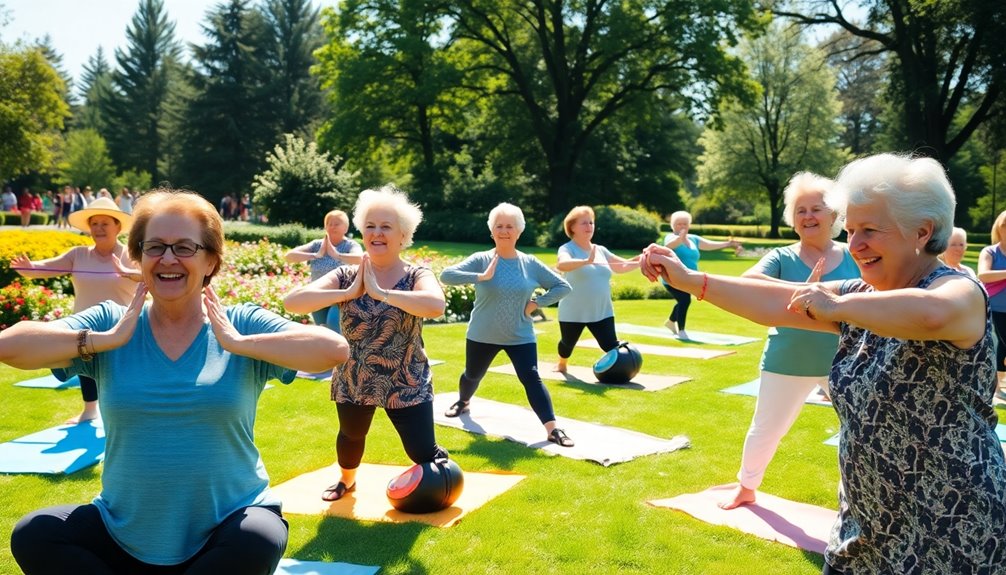
Low-impact exercises can be a fantastic way to stay active without putting excessive strain on your body. Activities like yoga and tai chi boost bone density and help reduce the risk of osteoporosis. Resistance exercises strengthen muscles and bones, making them beneficial complements to your routine. Swimming and cycling minimize joint stress, making them perfect if you have arthritis. You'll also enjoy the stress-reducing benefits of yoga, which releases endorphins to improve your mood. Incorporating simple chair exercises can help those with mobility issues. Additionally, engaging in regular exercise can improve mental health and cognitive function, similar to how dogs benefit from mental challenges. Regular low-impact workouts not only strengthen your heart but also enhance mental health and sleep quality.
Prioritize Fall Prevention Techniques
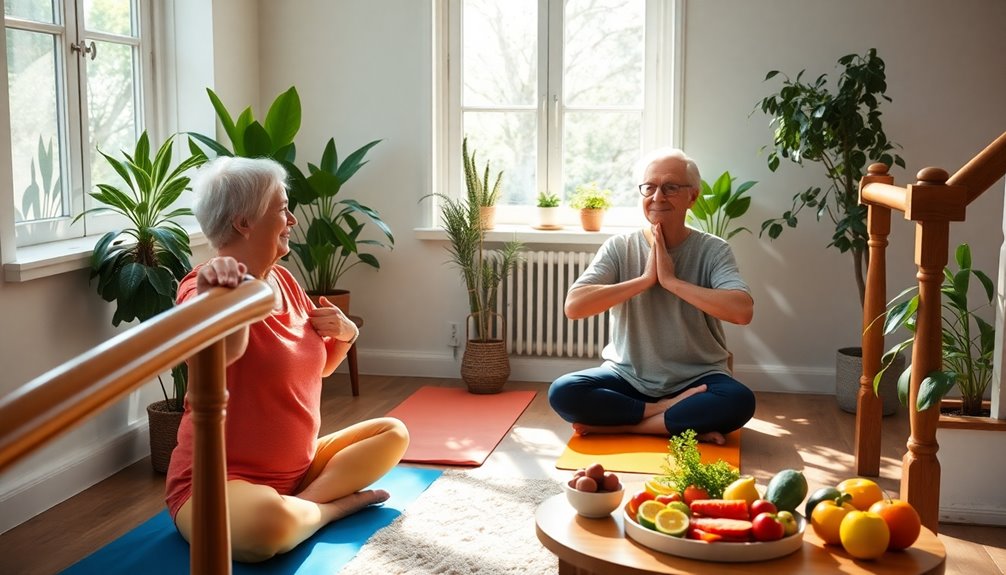
To maintain independence and safety as we age, prioritizing fall prevention techniques is essential.
Start by incorporating exercise interventions into your routine; these can significantly reduce your risk of falls. Multifactorial interventions have also shown effective results in reducing falls among older adults.
Assess your home for hazards—improve lighting, secure rugs, and keep pathways clutter-free.
Regular vision checks are vital to ensure you see clearly and avoid tripping.
Don't hesitate to utilize assistive devices like canes or grab bars; they can enhance your stability.
Consider multifactorial approaches by addressing health conditions and medications with your healthcare provider.
Engaging with occupational therapists can also provide tailored strategies to help you stay safe.
Engage in Lifelong Learning Opportunities
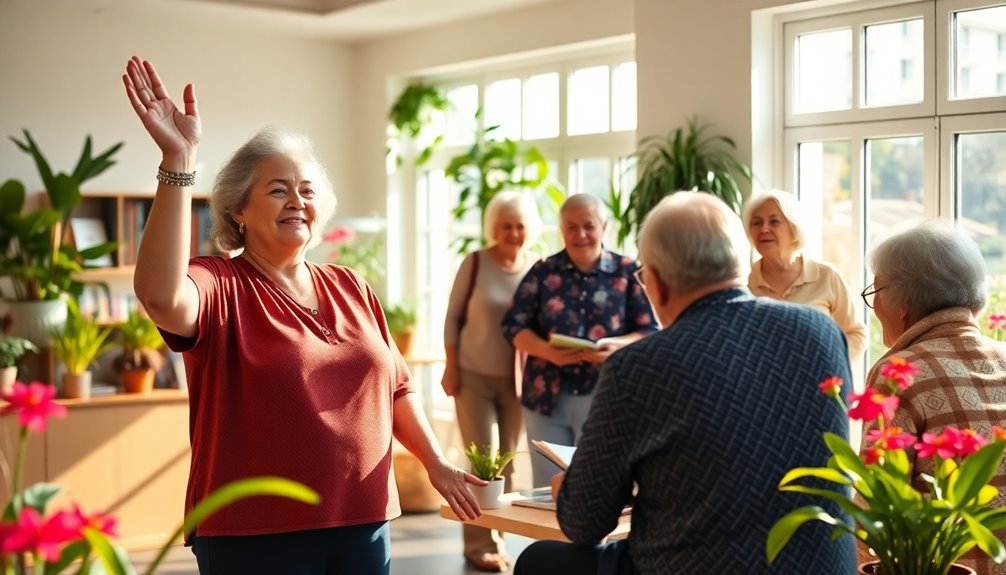
Engaging in lifelong learning opportunities not only sharpens your mind but also enriches your life in countless ways. It helps maintain cognitive health, reducing the risk of decline and dementia. By stimulating your brain, you're creating new neural pathways and improving your memory as you tackle new information. This strengthens your cognitive reserve, potentially delaying dementia's onset. Additionally, continuous intellectual engagement supports brain health and promotes critical thinking skills. Moreover, trust creation is essential for individuals with significant assets, as it can provide long-term benefits for financial planning and security.
Acquiring new skills boosts your self-esteem and emotional well-being, giving you a renewed sense of purpose. Many institutions offer discounted programs, and online resources make learning accessible from home. Participating in workshops and community activities fosters engagement, allowing you to master new technologies and connect with others. Embrace learning, and watch your quality of life soar!
Nurture Social Connections and Friendships
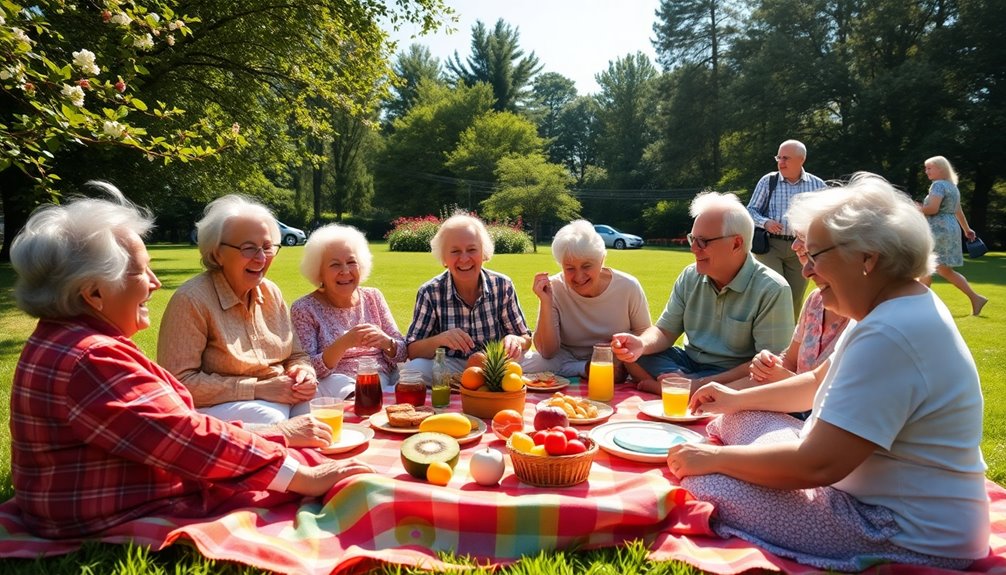
While maintaining social connections may seem challenging as you age, it's crucial for your overall well-being. Strong social ties reduce stress, anxiety, and depression, improving your mood and self-esteem. Engaging with others not only enhances happiness but also boosts cognitive function, helping to combat decline. Additionally, the intersection of celebrity lifestyles and social engagement highlights the importance of companionship in achieving a fulfilling life.
Plus, studies show that a vibrant social network can lead to increased longevity and better cardiovascular health. Joining a group or club provides opportunities to share hobbies and interests, further nurturing these connections.
To nurture these connections, consider joining senior communities or participating in local programs. Volunteering can provide purpose while fostering relationships. Participating in group activities and events can also enhance your social network and create a sense of belonging. Additionally, exploring smart charitable giving methods can not only benefit those in need but also connect you with like-minded individuals who share your values. By engaging in these practices, you cultivate a supportive environment that enriches both your life and the lives of others.
Don't underestimate technology; video calls can keep you close to distant loved ones. Taking the initiative to connect with neighbors can also create a supportive environment, enhancing your sense of belonging and overall health.
Incorporate Nutrient-Dense Foods Into Your Diet

As you age, incorporating nutrient-dense foods into your diet becomes essential for maintaining health and vitality. Focus on leafy greens like kale and spinach, and add cruciferous vegetables such as broccoli and Brussels sprouts for their rich nutrients. Low carb high protein breakfast ideas can also be beneficial in providing energy without excessive carbohydrates. Include fresh fruits, particularly berries, to boost cognitive health with antioxidants. Whole grains like oatmeal and brown rice provide necessary fiber, while lean proteins from fish, poultry, and legumes support muscle maintenance. Don't forget healthy fats from avocados, nuts, and olive oil to promote heart health. To further enhance your diet, aim to avoid processed foods which can be high in sodium, sugar, and unhealthy fats. Aim for a balanced diet, manage portion sizes, and stay hydrated by drinking plenty of fluids daily.
Utilize Technology for Social Engagement

Utilize technology to enhance your social engagement. Video conferencing tools like Zoom and FaceTime let you see loved ones face-to-face, reducing feelings of loneliness. Social media platforms help you stay connected with family and friends, supplementing your existing ties. Additionally, smart home devices can assist you in managing your daily activities while keeping in touch with your loved ones through voice commands and notifications. Engaging in somatic therapy techniques can further improve emotional well-being, aiding in your overall health journey.
Consider joining online hobby groups or book clubs to meet new people and explore interests. Plus, volunteering remotely allows you to contribute to your community while staying socially engaged.
With some training and support, you can overcome barriers to using technology, leading to reduced isolation and improved life satisfaction. Embrace these tools for a healthier, happier you!
Practice Mindfulness and Relaxation Techniques
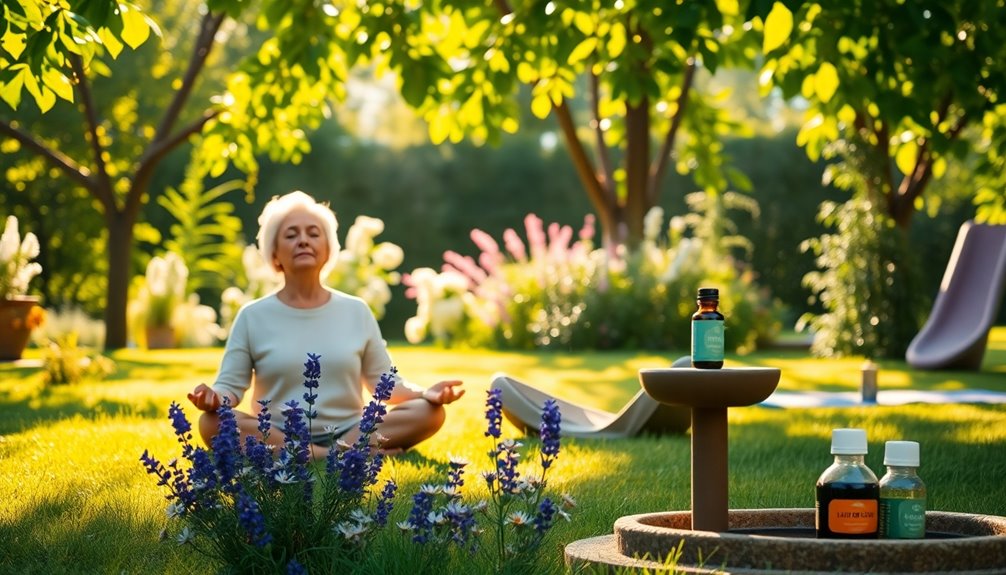
Practicing mindfulness and relaxation techniques can significantly enhance your overall well-being, especially as you navigate the challenges of aging. These practices reduce stress and anxiety while improving cognitive function and emotional resilience. You can start with focused meditation or mindful breathing to calm your mind and enhance your attention span. Incorporating deep breathing exercises or progressive muscle relaxation can further alleviate tension. Regular physical activity, such as gentle yoga, complements these relaxation techniques by promoting both physical and mental health.
Mindfulness practices, such as sound meditation, can help block internal chatter and external distractions, providing an additional layer of tranquility. Consider gentle yoga or engaging in creative arts to express yourself and find peace. Establishing a routine and creating a quiet environment will help you stay consistent. Don't forget that participating in group activities can foster connections and support. By integrating these techniques into your daily life, you'll promote overall health and emotional stability.
Stay on Top of Preventive Healthcare

Staying proactive about your health is crucial, especially as you age. Preventive healthcare can significantly enhance your quality of life by helping you avoid chronic diseases and ensuring early detection of health issues. Regular check-ups, vaccinations, and screenings should be part of your routine. It's essential to utilize team-based care models to improve access to these services and reduce financial barriers like high copays. Additionally, understanding financial considerations for elderly care can help you plan for necessary healthcare services. Keeping a health diary can help you track changes and manage medications effectively. Remember, preventive care not only supports your independence but also contributes to increased life expectancy. Engaging in modifiable behaviors such as smoking cessation and regular exercise can further boost your overall health as you age.
Explore the Benefits of Music Therapy

As you age, exploring the benefits of music therapy can be a transformative experience for your overall health.
Music therapy can evoke powerful emotions, reducing anxiety, stress, and depression while uplifting your mood and self-esteem. Tailored to your specific needs, these sessions not only enhance emotional well-being but also combat loneliness through social interaction. Additionally, music-based interventions are designed to address both physical and cognitive needs, creating a holistic approach to wellness. Research has shown that personalized learning pathways in therapy can significantly improve outcomes for seniors.
Engaging in music activities stimulates cognitive functions, improving memory and slowing cognitive decline, particularly in seniors with dementia or Alzheimer's.
Physical participation, like singing or dancing, enhances coordination, balance, and flexibility.
Frequently Asked Questions
How Can I Find Suitable Exercise Programs for Seniors?
To find suitable exercise programs for seniors, start by researching local community centers or gyms that offer tailored classes.
Look for programs like EnhanceFitness or Geri-Fit, which focus on strength and flexibility. You can also check online resources for virtual classes, like Active Living Every Day.
Don't forget to consult with healthcare providers to ensure the chosen activities align with your health needs and abilities.
Getting involved in group sessions can enhance motivation too!
What Are the Best Foods to Boost Energy Levels?
To boost your energy levels, focus on incorporating nutrient-dense foods into your diet.
Try hummus with carrots for sustained energy, or enjoy tuna for its omega-3s. Add bananas for a quick boost and include whole grains like quinoa for lasting power.
Don't forget to stay hydrated with watermelon and berries.
Regular meals are key, so combine these foods for balanced nutrition and keep your energy steady throughout the day.
How Do I Start Learning New Technology as a Senior?
To start learning new technology as a senior, explore resources like video tutorials and in-person classes at local centers.
Consider free online training sessions or phone support for personalized guidance. Engaging with peers in a classroom setting can make learning enjoyable and collaborative.
Don't hesitate to ask for help from younger family members or mentors through programs like Cyber-Seniors.
Embrace the process, and you'll discover how technology can enhance your daily life!
What Are Effective Ways to Stay Motivated in Exercise?
Imagine you're planting a garden; without sunlight and water, nothing thrives.
To stay motivated in exercise, treat your routine like that garden. Incorporate enjoyable activities, vary your workouts, and engage socially—whether it's walking with friends or joining a class.
Set realistic goals and celebrate your progress like blooming flowers. Keep track of your achievements and visualize your success.
How Can I Identify Signs of Nutritional Deficiencies?
To identify signs of nutritional deficiencies, pay attention to any changes in your health.
Look for symptoms like memory loss, weakness, or mood swings.
Keep track of your diet by using a food diary or an app, and don't hesitate to consult with healthcare professionals for personalized advice.
Regular health check-ups and blood tests can also help catch deficiencies early, ensuring you maintain optimal health as you age.
Conclusion
Imagine waking up each day with a spring in your step, surrounded by friends and the soothing sounds of your favorite music. By embracing these wellness hacks, you're not just enhancing your health; you're painting a vibrant picture of life filled with activity, laughter, and purpose. So, lace up those sneakers, reach out to a buddy, and let the rhythm of mindfulness guide you. Your golden years can be a beautiful tapestry of joy and well-being—start weaving it today!
References
- https://sonataseniorliving.com/healthy-aging-hacks-by-senior-living-experts/
- https://homehelpershomecare.com/clearwater/community-blog/2024/july/top-10-health-and-wellness-tips-for-seniors/
- https://hr.ucsf.edu/wellbeing/coping-and-resiliency-program/cope-program-wellness-resources/maintaining-wellness-older-adults-and-caregivers
- https://www.wesleylife.org/blog/10-tips-for-seniors-to-achieve-wellness-at-home
- https://www.residencesatplainview.com/senior-health-hacks-simple-strategies-for-everyday-wellness/
- https://thegreenfields.org/5-benefits-exercise-seniors-aging-adults/
- https://www.niddk.nih.gov/health-information/weight-management/healthy-eating-physical-activity-for-life/health-tips-for-older-adults
- https://www.ncoa.org/article/the-life-changing-benefits-of-exercise-after-60
- https://www.nia.nih.gov/health/healthy-aging/what-do-we-know-about-healthy-aging
- https://odphp.health.gov/myhealthfinder/health-conditions/obesity/stay-active-you-get-older-quick-tips

